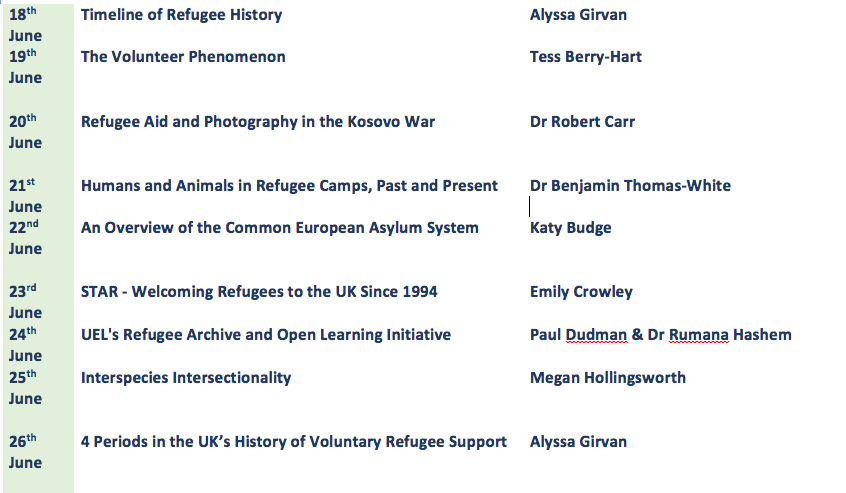Guest post by Hari Reed, UEA Refugee History
20 Years of Refugee Aid, Advocacy and Activism
In recognition of the 20thanniversary of Refugee Week, UEA Refugee History are publishing one blog per day – here – on our website, for the duration of the week.
Each blog looks at an aspect of refugee aid, advocacy or activism over the past 20 years or so. Some of these blogs explore the history of a specific volunteer group in the UK, such as Student Action for Refugees, while others focus on how changes to European refugee law and British immigration policy have affected the relationship between refugees and volunteer groups more widely.
The 20thanniversary of Refugee Week is the perfect opportunity to reflect on refugee solidarity in the UK. In recent history, independent voluntary and grassroots organisations have taken the lead when it comes to supporting refugees. The number and type of support groups in the UK is large and still growing, and these groups play a vital role at every point in the asylum process.
Some organisations work locally while others have grown to national proportions; some provide daily support while others focus on large awareness-raising and fundraising campaigns and events. It is necessary to consider how these groups function in our society today, particularly since the “refugee crisis” sparked an increase in both supportive and hostile attitudes towards refugees in the UK.
While the recent movement of people to Europe has had a significant effect on British and European aid, advocacy and activism, we will also show that independent voluntary refugee organisations have been supporting displaced people alongside, or in lieu of, government schemes, for almost 100 years.
Refugee History will be providing articles and resources throughout the week that focus on the wider historical context of refugee aid in the UK. These will show that, although the roles of volunteers have changed in different historical, political and social circumstances, volunteers have always been a crucial part of campaigns and practical efforts to receive and resettle refugees. This means that, in order to fully understand refugee reception and resettlement in the UK, we need to understand the work of voluntary groups.
Schedule of Refugee Week Contributions
Keep up to date with these publications on our website, on Twitter or via our Facebook event. Alternatively, check back here at the end of the week for an overview with links to each piece.
